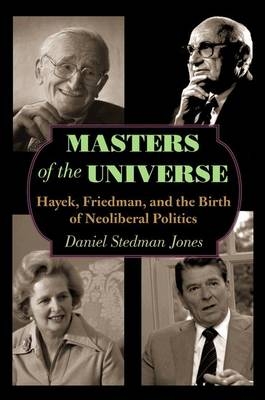
Masters of the Universe
Princeton University Press (Verlag)
978-0-691-15157-1 (ISBN)
- Titel erscheint in neuer Auflage
- Artikel merken
How did American and British policymakers become so enamored with free markets, deregulation, and limited government? This book--the first comprehensive transatlantic history of the rise of neoliberal politics--presents a surprising answer. Based on archival research and interviews with leading participants in the movement, Masters of the Universe traces the ascendancy of neoliberalism from the academy of interwar Europe to supremacy under Reagan and Thatcher and in the decades since. Daniel Stedman Jones argues that there was nothing inevitable about the victory of free-market politics. Far from being the story of the simple triumph of right-wing ideas, the neoliberal breakthrough was contingent on the economic crises of the 1970s and the acceptance of the need for new policies by the political left. Masters of the Universe describes neoliberalism's road to power, beginning in interwar Europe but shifting its center of gravity after 1945 to the United States, especially to Chicago and Virginia, where it acquired a simple clarity that was developed into an uncompromising political message.
Neoliberalism was communicated through a transatlantic network of think tanks, businessmen, politicians, and journalists that was held together by Friedrich Hayek and Milton Friedman. After the collapse of Bretton Woods in 1971, and the "stagflation" that followed, their ideas finally began to take hold as Keynesianism appeared to self-destruct. Later, after the elections of Reagan and Thatcher, a guileless faith in free markets came to dominate politics. Fascinating, important, and timely, this is a book for anyone who wants to understand the history behind the Anglo-American love affair with the free market, as well as the origins of the current economic crisis.
Daniel Stedman Jones is a barrister in London. He was educated at the University of Oxford and at the University of Pennsylvania, where he earned a PhD in history. He has worked as a policy adviser for the New Opportunities Fund and as a researcher for Demos.
Acknowledgments ix Timeline xi List of Abbreviations xiii Introduction 1 The Three Phases of Neoliberalism 6 Neoliberalism and History 10 Transatlantic Neoliberal Politics 15 1. The Postwar Settlement 21 2. The 1940s: The Emergence of the Neoliberal Critique 30 Karl Popper and "The Open Society" 37 Ludwig von Mises and "Bureaucracy" 49 Friedrich Hayek and "The Road to Serfdom" 57 The Mont Pelerin Society and "The Intellectuals and Socialism" 73 3. The Rising Tide: Neoliberal Ideas in the Postwar Period 85 The Two Chicago Schools: Henry Simons, Milton Friedman, and Neoliberalism 89 The Enlightenment, Adam Smith and Neoliberalism 100 Economic and Political Freedom: Milton Friedman and Cold War Neoliberalism 111 The German Economic Miracle: Neoliberalism and the Soziale Marktwirtschaft 121 Regulatory Capture, Public Choice, and Rational Choice Theory 126 4. A Transatlantic Network: Think Tanks and the Ideological Entrepreneurs 134 The United States in the 1950s: Fusionism and the Cold War 138 British Conservatism in the 1950s 147 Neoliberal Organization in the 1950s and 1960s 152 The Second Wave: Free Market Think Tanks in the 1970s 161 Neoliberal Journalists and Politicians 173 Breakthrough? 178 5. Keynesianism and the Emergence of Monetarism, 1945-71 180 Keynes and Keynesianism 182 "A Little Local Difficulty": Enoch Powell's Monetarism 190 American Economic Policy in the 1960s 197 Milton Friedman's Monetarism 201 The Gathering Storm 212 6. Economic Strategy: The Neoliberal Breakthrough, 1971-84 215 The Slow Collapse of the Postwar Boom, 1964-71 217 Stagflation and Wage and Price Policies 225 The Heath Interregnum and the Neoliberal Alternative 230 The Left Turns to Monetarism, 1: Callaghan, Healey, and the IMF Crisis 241 The Left Turns to Monetarism, 2: Jimmy Carter and Paul Volcker's Federal Reserve 247 Thatcherite Economic Strategy 254 Reaganomics 263 Conclusion 269 7. Neoliberalism Applied? The Transformation of Affordable Housing and Urban Policy in the United States and Britain, 1945-2000 273 Postwar Low-Income Housing and Urban Policy in the United States 278 Postwar Low-Income Housing and Urban Policy in Britain 288 Jimmy Carter and the Limits of Government 295 Property-Owning Democracy and Individual Freedom: Housing and Neoliberal Ideas 297 The Reagan Administration 304 Council House Privatization: The Right to Buy Scheme 308 Transatlantic Transmissions: Reagan's Enterprise Zones 315 Hope VI, Urban Regeneration, and the Third Way 321 Conclusion 325 Conclusion - The Legacy of Transatlantic Neoliberalism: Faith-Based Policy 329 Parallelisms: The Place of Transatlantic Neoliberal Politics in History 333 The Apotheosis of Neoliberalism? 338 Reason-Based Policymaking 343 Notes 347 Index 391
| Erscheint lt. Verlag | 16.9.2012 |
|---|---|
| Zusatzinfo | 1 table. |
| Verlagsort | New Jersey |
| Sprache | englisch |
| Maße | 156 x 235 mm |
| Gewicht | 482 g |
| Themenwelt | Geisteswissenschaften ► Geschichte ► Regional- / Ländergeschichte |
| Sozialwissenschaften ► Politik / Verwaltung ► Politische Systeme | |
| Sozialwissenschaften ► Politik / Verwaltung ► Politische Theorie | |
| ISBN-10 | 0-691-15157-1 / 0691151571 |
| ISBN-13 | 978-0-691-15157-1 / 9780691151571 |
| Zustand | Neuware |
| Haben Sie eine Frage zum Produkt? |
aus dem Bereich



